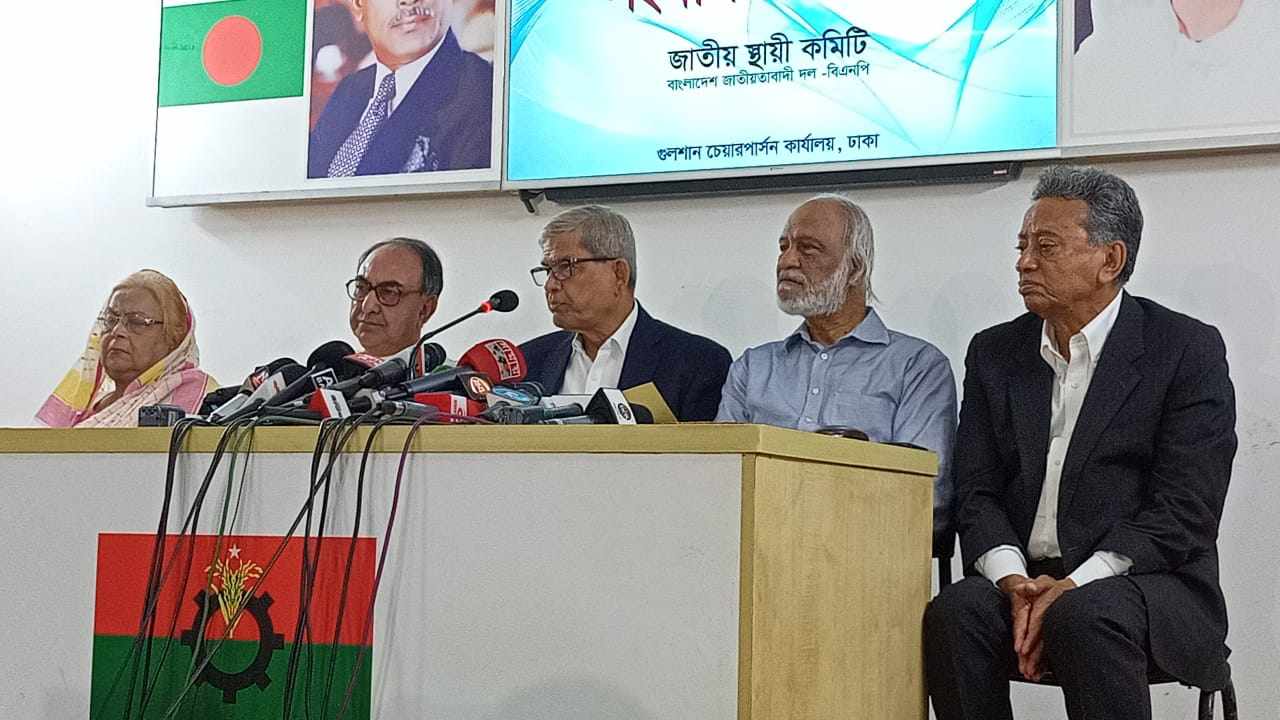Staff Correspondent
Published:2023-07-13 20:58:29 BdST
BNP places 31-point state reform proposal
BNP secretary general Mirza Fakhrul Islam Alamgir has placed 31-point charter as state reform proposal.
He declared the charter at a press conference in BNP chairperson's Gulshan office in the capital on Thursday morning.
The 31-point charter is the updated version of the party's previously declared 27-point proposal.
Mirza Fakhrul Islam Alamgir said, 31 outline of economic liberation of people, suffrage and establishment of democracy was announced through the democratic reform of constitution and state system.
He said, this outline has been given not for the change of government or elections, but for the democratic change of the state. The outline has been finalized to establish BNP as a public welfare organization keeping in tune with the changing needs of the people.
Mirza Fakhrul said that the outline has been prepared considering the suggestions of various parties, people and media. If BNP comes to power, a government of national consensus will be formed from the parties in the movement.
31 points announced by BNP
1. An inclusive, non-discriminatory and harmonious government will be established on the basis of Bangladeshi nationalism, combining all views and paths. For this reason, a new type of social agreement towards the future should be reached based on discussion, exchange of views and mutual understanding. A committee will be constituted for this purpose.
2. An ‘electoral non-partisan caretaker government’ system will be introduced to institutionalize the democratic process.
3. The executive powers of the Prime Minister and the Council of Ministers will be balanced. The powers, responsibilities and duties of the executive department, legal department and judicial department will be coordinated with the aim of establishing the balance of state power.
4. No one can serve as Prime Minister for more than two consecutive terms.
5. In addition to the existing parliamentary system, an ‘Upper House Legislature’ will be introduced in the Parliament comprising eminent citizens of the country, distinguished academics, professionals, political scientists, sociologists and people with administrative experience, with the aim of managing the state with expert knowledge.
6. The issue of amending Article 70 of the Constitution will be examined to ensure the freedom of opinion of members of parliament on all matters other than the vote of confidence, money bill, constitution amendment bill and matters involving national security.
7. The present ‘Chief Election Commissioner and Other Election Commissioners Appointment Act, 2022’ will be amended with a view to forming an effective Election Commission consisting of impartial and acceptable persons based on the opinions
of political parties and eminent persons. Voting will be ensured through paper-ballot in all centers and not EVM. The Political Party Registration Act will be reformed. The use of party symbols in local government elections will be abolished.
8. With the aim of establishing transparency, accountability and credibility in state, constitutional and statutory institutions, these institutions will be restructured through legal reforms. Appointments to constitutional and important positions in the organization will be subject to vetting by parliamentary committees through hearings.
9. Effective independence of judiciary will be ensured in the light of Bangladesh constitution and Masdar Hossain case verdict. A ‘Judicial Commission’ will be constituted to reform the present judicial system. The control and discipline of the subordinate courts shall be vested in the Supreme Court. There will be a separate secretariat for the Judiciary under the control of the Supreme Court. The system of ‘Supreme Judicial Council’ mentioned in the Constitution will be re-introduced on the question of impeachment of Supreme Court judges. For this, necessary amendments will be brought in the constitution. Judges will be appointed above party discretion. In order to appoint judges of the Supreme Court, a ‘Judge Appointment Act’ containing specific qualifications and criteria will be framed as per Article 95 (c) of the Constitution.
10. An ‘Administrative Reforms Commission’ consisting of qualified, experienced and experienced persons will be constituted to reform and reorganize the administration. Merit will be considered as the sole criterion for appointment, transfer and promotion in civil and military administration.
11. A ‘Media Commission’ consisting of former Supreme Court judges, media professionals and experienced and acceptable media persons will be formed to ensure complete freedom of the media and complete reforms. Necessary steps will be taken for independent journalism. Justice for torture and murder of all journalists, including Sagar-Rooney’s murder, will be ensured.
12. A white paper investigating money laundering and corruption in the past decade and a half will be published and legal action will be taken against those identified. ACC’s transparency and accountability will be ensured by reforming the Anti-Corruption Commission and the Anti-Corruption Act as well as systemic reforms. An ‘ombudsman’ will be appointed as per the constitution.
13. Rule of law will be established at all levels. Extrajudicial killings will end. Appointments will be made to the Human Rights Commission based on specific criteria.
14. An ‘Economic Reforms Commission’ will be formed to ensure economic justice. Rich-poor disparity will be eliminated through equitable distribution of the benefits of growth.
Unauthorized use or reproduction of The Finance Today content for commercial purposes is strictly prohibited.


